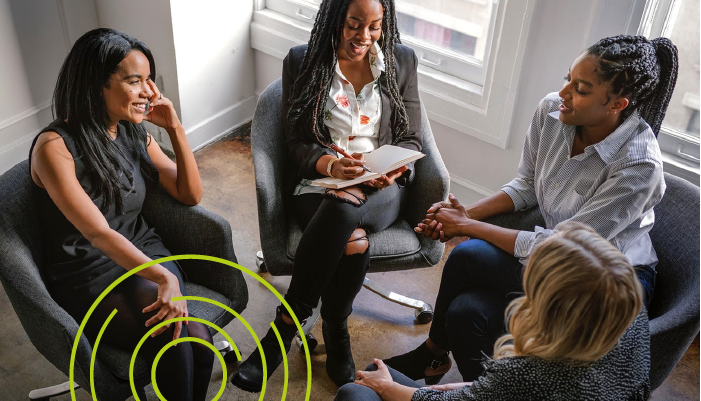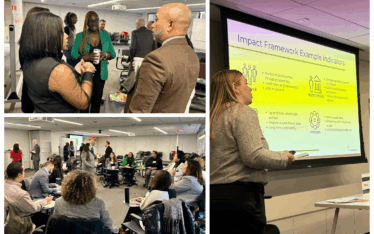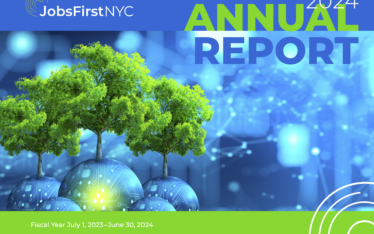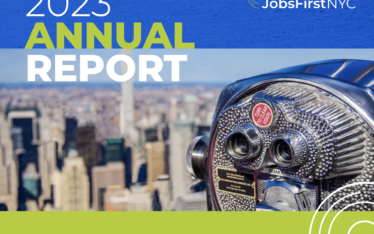JobsFirstNYC has made important strides for New York City’s young-adult workforce for nearly 15 years, and we’re finding new ways to apply the wisdom gained since our inception.
New York City has been the economic capital of the free world for more than a century, home to millionaires and billionaires. But for many years, the city has also been home to an alarming number of young adults who are out of school and out of work—with limited prospects for career opportunities and, therefore, limited opportunities to increase their earning potential. In 2006, the leaders of numerous foundations, government agencies, and nonprofits partners decided to do something about the challenges young adults face. This new collective gave birth to JobsFirstNYC, an intermediary organization that would leverage community assets, corporate interests, and government resources to break down barriers and bring opportunity within reach. And those efforts made a difference. With innovative partnership models such as the Bronx Opportunity Network, Lower East Side Employment Network, Young Adult Sectoral Employment Project, and YouthWINS—and the good fortune of a thriving economy, we’ve helped put thousands more young adults on the path to economic mobility.
But as New York’s economy has continued to evolve, that’s not enough. Most of the young adults getting new jobs in recent years have been limited to part-time positions; meanwhile, wages for the same group have mostly stagnated and pervasive challenges continue to plague certain neighborhoods far more than others. In an era when more and more jobs require education and training beyond high school, we’ve seen a marked decline in the number of young adults starting college but never graduating.
None of this happened overnight, and JobsFirstNYC has made an important shift to address these trends in the last decade. But we have finally reached a tipping point. In response, JobsFirstNYC is expanding our approach, bolstering our capacity, and sharing our new strategies more widely. Where we once considered our challenge more narrowly—keeping young adults in school and finding jobs for those who are unemployed—we’re now doubling down on efforts to address the root causes in affected communities and across systems designed to support young adults. These more holistic efforts will require new approaches and unconventional partnerships. To that end, our staff and board are committing themselves to a unique and critical role—one that brings together key players to identify challenges, test new solutions, and advance what works. We’re not simply a “neutral intermediary” building partnerships for partnerships’ sake. We’re like an incubator, working with others to build bold and unconventional initiatives, knowing that some may fail and some will succeed beyond our wildest expectations.
Although we’re expanding some of our tactics, our goal remains the same. We’re not exploring completely new territory as much as we are digging deeper in the territories we’ve traversed for nearly 15 years. We’re increasing our ability to break down barriers and transform the systems that support young adults and their communities, with new approaches like these:
- Formalizing our collaborative 5-step process to identify critical challenges, conduct research, test new solutions, and advance what works—no matter the issue.
- Championing the development of a single-system strategy that starts in high school, connects young adults to meaningful postsecondary and training opportunities, and supports young adults as they advance in their careers.
- Focusing on solutions within three critical areas: (1) Creating tailored solutions in communities with high numbers of young adults who are out of school and out of work; (2) working with the K-12 and higher education systems to improve education outcomes, and (3) identify, design, and advance practices and policies that achieve better outcomes for employers and workers.
Together with more than 160 incredible partners, we’re driving impact across New York City with some emerging initiatives. We’ve launched the Transfer 2 Career Collaborative pilot in partnership with New Visions for Public Schools, which is building partnerships between 11 workforce development organizations and 12 transfer high schools to improve career readiness and postsecondary outcomes for over-age, under-credited students at the highest risk of becoming out-of-school and out-of-work.
We co-founded and co-chair the Invest In Skills NY coalition, which successfully advocated for a $175-million state investment into the workforce development system and are working at the city-level to advance a single-system strategy that prepares rising generations for the future of work.
JobsFirstNYC is working with teams of residents and community-based organizations in multiple neighborhoods across New York City to create localized solutions that respond to the unique needs of specific neighborhood communities. In Brownsville (Brooklyn), the community has begun imagining ways to leverage initial investments from the Robin Hood Foundation as one of their Mobility LAB sites. That work is unfolding alongside our latest efforts in the Jerome Avenue Corridor (Bronx), and Bedford Stuyvesant (Brooklyn), where we’re supporting community members through our five-step innovation process to address the causes of poverty in their neighborhoods and provide access to economic opportunities for young adults and the communities they call home.
Our impact begins with partners committing to an inclusive change process; continues with the development of new solutions leading to tangible outcomes for young adults, their communities, and our partners who serve them; and multiplies through the scale of proven practices and policies across systems. For each of our solutions, we track and measure the impact of our work across four levels:
- People: Are more people accessing economic opportunity and achieving economic mobility?
- Institutions: How have individual institutions—such as non-profits, employers, colleges, Investors, high schools—transformed their own thinking and practice?
- Partnerships: How has our collective infrastructure strengthened economic mobility outcomes of people and communities?
- Systems: How have systems shifted as a result of new solutions that improve economic outcomes for young adults and their communities?
As we launch the next era of JobsFirstNYC, we hope philanthropic investors will see us as a place to test new ideas and determine what works. We hope local communities and community-based organizations will see us as a partner that’s willing and ready to turn their ideas into action. We hope policymakers will learn from our work by applying innovative policies to fuel economic mobility. And we hope that employers will partner with us as they continue to seek out talent solutions.





